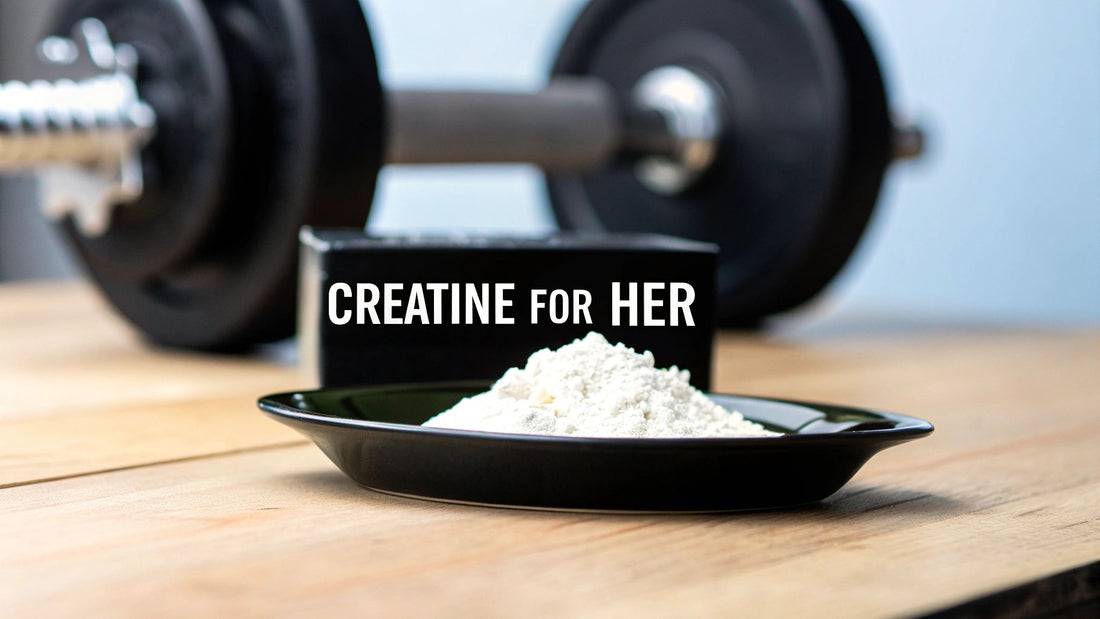
Can Women Take Creatine? Your Definitive Guide
Share
Let’s just get this out of the way: Yes, women can and absolutely should take creatine. It’s one of the safest, most studied, and most effective supplements out there for building strength, recovering faster, and even sharpening your focus.
It’s time to forget the old gym myth that this stuff is only for guys trying to bulk up.
Why Creatine Is a Woman's Best Friend
So many women are hesitant to try creatine because of all the misinformation floating around. The biggest fear? Getting "bulky." That, along with worries about bloating, comes from a total misunderstanding of how creatine actually works in a woman's body.
Think of creatine less like a muscle-inflater and more like a personal energy recharger for your cells.
Its main job is to help your body recycle its go-to energy source, a molecule called ATP. This is like having a portable power bank for your muscles and brain. It lets you push out that one extra rep, sprint a little harder, and feel less wrecked between your workouts.
The bottom line is creatine helps your muscles work harder, for longer. That’s the real secret to building lean, toned muscle—not unwanted size. It supports your goals by boosting what you can do, not by magically adding mass.
Before we get into the details, here’s a quick rundown of everything you need to know.
Creatine for Women At a Glance
This table breaks down the key facts, so you can see why it’s such a game-changer.
Aspect |
Key Information |
|---|---|
Primary Benefit |
Gives you more strength, power, and better performance in your workouts. |
Common Concern |
The fear of "bulking up" is a total myth. Creatine helps you build lean, sculpted muscle. |
Recommended Type |
Creatine monohydrate is the gold standard—it's the most researched and proven form. |
Standard Dosage |
A simple 3-5 grams per day is all you need to see results. No complicated cycles. |
Safety Profile |
It’s incredibly safe and backed by decades of solid scientific research. |
In short, it’s a simple, effective tool to help you get more out of the hard work you’re already putting in.
How Creatine Actually Works for Women

Let’s clear one thing up: creatine isn’t some weird, synthetic lab chemical. It’s a natural compound your body already makes from amino acids. You also get it from foods like red meat and fish.
Its main job? To help regenerate your body's most important energy source: adenosine triphosphate (ATP).
Think of ATP as the battery pack for your muscles. It powers every explosive movement—every single squat, sprint, or jump. The problem is, this battery drains almost instantly when you’re training hard.
That's where creatine comes in. It acts like a fast-charger for your muscles, quickly rebuilding your ATP stores. This simple cycle lets you push out those extra few reps that actually build strength and shape.
The Energy Advantage for Women
This energy-recharging system is a game-changer for the female body. Here's why: women naturally have 70-80% lower creatine stores than men. That means we start with less of this critical energy reserve in the tank, making supplementation one of the smartest ways to level the playing field.
And then there are hormones. Fluctuations from our monthly cycle all the way through menopause can mess with our energy, mood, and muscle function. Creatine helps stabilize the energy supply in your muscles and your brain, giving you a steady foundation to work from.
By topping off your body’s energy reserves, creatine gives you a consistent power source to perform your best—no matter where you are in your cycle or what your natural baseline is.
So, when you ask, "can women take creatine?" the answer is about understanding your own physiology. This isn't about adding something foreign; it's about optimizing the system you already have. It works by:
-
Refilling ATP so you have immediate power for intense lifts.
-
Boosting muscle endurance to help you fight off fatigue.
-
Speeding up recovery between sets so you can get more work done.
Ultimately, creatine gives your body more of what it needs to get stronger, perform better, and finally see the results you’re working so hard for.
Unlocking the Surprising Benefits for Women

While creatine is famous for what it does in the gym, some of its most impressive effects are actually mental. Your brain is a high-energy organ that burns through ATP just like your muscles do. Creatine helps keep those brain cells fully charged.
That means you might notice less mental fog, sharper short-term memory, and better focus when you really need it. Think of it as fuel for your mind and your body, helping you stay on top of your game everywhere.
But it doesn’t stop there. Research is starting to show a powerful link between creatine levels and mood. By helping restore your brain's energy balance, creatine may play a role in easing symptoms of depression and promoting a more stable, positive outlook.
More Power and Faster Recovery
Of course, the physical perks are what creatine is known for, and they are a game-changer. Supplementing helps you unlock more strength and power in your workouts, letting you lift heavier and push harder. That extra intensity is exactly what you need to build lean, sculpted muscle.
Here's what you can expect:
-
Increased Power Output: You'll feel stronger during explosive movements like squats, deadlifts, and sprints. This is where you'll see your numbers really start to climb.
-
Enhanced Endurance: It helps you fight off that "I can't do one more" feeling, letting you squeeze out those last few reps that truly make a difference.
-
Quicker Recovery: By helping your muscles refuel faster, creatine reduces soreness and gets you ready for your next workout sooner. Better consistency means better results.
For women looking to build stronger, fuller glutes, this blend of power and recovery is the perfect formula. If that’s your goal, check out our guide on the best creatine for glute growth.
When you ask "can women take creatine," the answer is so much more than a simple yes. It’s a tool that supports your total well-being—from elevating your physical strength to sharpening your mental clarity and even supporting your mood.
While most of the old research focused on men, recent studies are finally confirming what so many women already know: creatine works. A 2021 study, for example, highlighted how it boosts exercise performance in pre-menopausal women while also noting its potential for cognitive and mood support.
It's not just another supplement; it's a way to optimize your body's own energy systems for better performance everywhere.
Busting the Biggest Creatine Myths for Women
Let's clear the air. There are so many myths floating around about creatine that keep women from trying one of the most effective, safest supplements out there. It’s time to separate gym gossip from actual science.
The number one fear I hear is, "Won't creatine make me look bulky?" Absolutely not. That bulky look comes from testosterone, and women have significantly lower levels than men. Creatine's job is to help you build strong, dense, lean muscle—the kind that creates a toned, sculpted physique, not massive size.
Another huge concern is bloating. While it's true creatine pulls water into your muscle cells, this is actually a good thing. It’s a process called cellular hydration, and it’s critical for performance and recovery. This isn't the same as the puffy, subcutaneous water retention you might get before your period. It’s functional water that makes your muscles look full and work better.
Separating Fact From Fiction
It’s frustrating when myths overshadow reality, especially when it comes to something as well-researched as creatine. Let’s finally set the record straight on a few of these.
Here’s a quick rundown of what’s really going on, based on actual evidence.
Creatine Myths Versus Reality for Women
Common Myth |
Scientific Fact |
|---|---|
"Creatine is a steroid." |
Not even close. Creatine is a natural compound made of amino acids your body already produces. It has no hormonal effects whatsoever. |
"It will make me gain weight." |
Any initial weight change is just water being drawn into your muscles, which is beneficial. Long-term use supports a leaner physique and does not cause fat gain. |
"It's just for male bodybuilders." |
False. Creatine supports strength, power, and lean muscle for anyone who trains—regardless of gender. Its benefits are universal. |
"It causes bloating and puffiness." |
The water retention is intramuscular (inside the muscle), leading to a fuller, more toned look—not subcutaneous bloating that makes you feel puffy. |
At the end of the day, the biggest "side effect" you’ll notice from taking creatine is that you can push harder in your workouts and recover smarter. That’s the real secret to changing your body composition, without any of the scary stuff you've been told.
This graphic breaks it down even further, showing just how minimal the side effects really are for women.
As you can see, the data speaks for itself. Side effects are incredibly rare, and staying hydrated is the simplest way to ensure you feel great. Now you can make a choice based on science, not fear.
A Practical Guide to Taking Creatine
Ready to get started? Let's cut through the noise. Taking creatine is incredibly simple, so don’t let anyone overcomplicate it for you. The real key is consistency—not some complex timing schedule or massive doses.
The best approach for most women is just a straightforward maintenance dose. All you need is 3-5 grams per day, every single day. That's it.
Forget the old-school "loading phase" that has you taking 20 grams a day for a week. A steady, daily dose gets your muscles to the same saturation point without any of the potential stomach issues. This simple routine works, and it's easy to stick with—which is what actually gets you results.
Choosing Your Creatine and Timing It Right
When you're browsing the supplement aisle, you'll see a ton of different creatine types. Just stick with creatine monohydrate. It’s the most researched, proven, and affordable option out there. There's really no need to pay extra for fancy versions that offer no real-world advantage.
So, when should you take it? Honestly, timing isn't a deal-breaker, but you can optimize it.
Taking your daily dose shortly after a workout with a small source of carbs—like a piece of fruit or in a protein shake—can give you a slight edge. The insulin spike helps shuttle the creatine into your muscle cells a bit more efficiently.
If you’re just starting out and aren't sure where to begin, taking a quick personalized creatine quiz can help you figure out the best approach for your specific needs.
Even though most of the older research focused on men, recent studies confirm that creatine is just as effective for women at every stage of life. It’s been shown to enhance strength in pre-menopausal women and improve muscle function in post-menopausal women, with some studies even pointing to benefits for mood and brain function. You can dig into these findings on PubMed.
The most important thing to remember is just to take it consistently. Whether you mix it in your morning coffee, your post-workout shake, or a glass of water, making it a daily habit is the secret to success.
Common Questions About Creatine for Women
Even with all the science, it’s completely normal to have some lingering questions before adding something new to your routine. Let’s walk through the most common ones we hear from women, so you can feel 100% confident.
One of the biggest concerns is always about the number on the scale. When you first start taking creatine, you might see a small jump of one to two pounds. Don't panic—this is not fat gain. It’s just your muscles pulling in more water, which is exactly how creatine works its magic to boost your performance and recovery.
Is Creatine Safe During Pregnancy or Breastfeeding?
This is a really important question, and the answer is simple: when in doubt, be cautious. While creatine is incredibly safe for most people, there just isn't enough specific research on its effects during pregnancy or while breastfeeding to give a clear green light.
For that reason, the standard advice is to avoid creatine supplementation during these times. Your best move is to always chat with your doctor before taking any new supplement while pregnant or nursing.
The golden rule is always to put your and your baby's safety first. Your healthcare provider can give you personalized advice for your unique situation.
Do I Need to Cycle Creatine?
You’ve probably heard gym talk about "cycling" supplements—taking them for a while, then stopping. For creatine, this is completely unnecessary. Unlike other compounds that can mess with your hormones, creatine is something your body already makes and uses every single day.
For the best results, consistency is key. A simple 3-5 gram dose each day is the most effective way to keep your muscles topped off and ready to work. No breaks needed.
What Happens If I Stop Taking It?
If you decide to stop taking creatine, nothing bad is going to happen. Seriously. Your body's creatine levels will just gradually return to their normal baseline over a few weeks. You might notice a small dip in your strength or endurance at the gym, but there are no negative side effects to worry about.
Have more questions? Our comprehensive creatine for women FAQ page has even more detailed answers to help you feel fully informed and ready to go.
At Bold Buns, we’re committed to giving you science-backed supplements that help you build the strong, toned body you deserve. Shop our women-focused creatine formula today.
